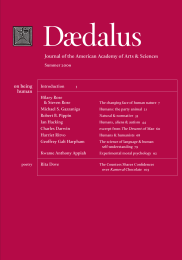Comparison of the Mental Powers of Man and the Lower Animals–continued
Editors’ note: This year marks the bicentennial of Charles Darwin’s birth. Darwin famously breathed new life into the philosophical and scientific debates about humanness by asserting in “The Descent of Man” (1871) that “the difference in mind between man and the higher animals, great as it is, is certainly one of degree and not of kind.” In chapter 4, excerpted here (from the second edition, 1879), Darwin examines the roots of morality in the instincts of lower animals.
I fully subscribe to the judgment of those writers who maintain that of all the differences between man and the lower animals, the moral sense or conscience is by far the most important. This sense, as Mackintosh remarks, ‘has a rightful supremacy over every other principle of human action’, it is summed up in that short but imperious word ought, so full of high significance. It is the most noble of all the attributes of man, leading him without a moment’s hesitation to risk his life for that of a fellow-creature; or after due deliberation, impelled simply by the deep feeling of right or duty, to sacrifice it in some great cause. Immanuel Kant exclaims, ‘Duty! Wondrous thought, that workest neither by fond insinuation, flattery, nor by any threat, but merely by holding up thy naked law in the soul, and so extorting for thyself always reverence, if not always obedience; before whom all appetites are dumb, however secretly they rebel; whence thy original?’
This great question has been discussed by many writers of consummate ability; and my sole excuse for touching on it, is the impossibility of here passing it over; and because, as far as I know, no one has approached it exclusively from the side of natural history.
The investigation possesses, also, some independent interest, as an attempt to see how far the study of the lower animals throws light on one of the highest psychical faculties of man. The following proposition seems to me in a high degree probably–namely, that any animal whatever, endowed with well-marked social instincts, the parental and filial affections being here included, would inevitably acquire a moral sense or conscience, as soon as its intellectual powers had become as well, or nearly as well developed, as in man. For, firstly, the social instincts lead an animal to take pleasure in the society of its fellows, to feel a certain amount of sympathy with them, and to perform various services for them. The services may be of a definite and evidently instinctive nature; or there may be only a wish and readiness, as with most of the higher social animals, to aid their fellows in certain general ways. But these feelings and services are by no means extended to all the individuals of the same species, only to those of the same association. Secondly, as soon as the mental faculties had become highly developed, images of all past actions and motives would be incessantly passing through the brain of each individual; and that feeling of dissatisfaction, or even misery, which invariably results, as we shall hereafter see, from any unsatisfied instinct, would arise, as often as it was perceived that the enduring and always present social instinct had yielded to some other instinct, at the time stronger, but neither enduring in its nature, nor leaving behind it a very vivid impression. It is clear that many instinctive desires, such as that of hunger, are in their nature of short duration; and after being satisfied, are not readily or vividly recalled. Thirdly, after the power of language had been acquired, and the wishes of the community could be expressed, the common opinion how each member ought to act for the public good, would naturally become in a paramount degree the guide to action. But it should be borne in mind that however great weight we may attribute to public opinion, our regard for the approbation and disapprobation of our fellows depends on sympathy, which, as we shall see, forms an essential part of the social instinct, and is indeed its foundation-stone. Lastly, habit in the individual would ultimately play a very important part in guiding the conduct of each member; for the social instinct, together with sympathy, is, like any other instinct, greatly strengthened by habit, and so consequently would be obedience to the wishes and judgment of the community. These several subordinate propositions must now be discussed, and some of them at considerable length. . . .
Access the full issue here.
